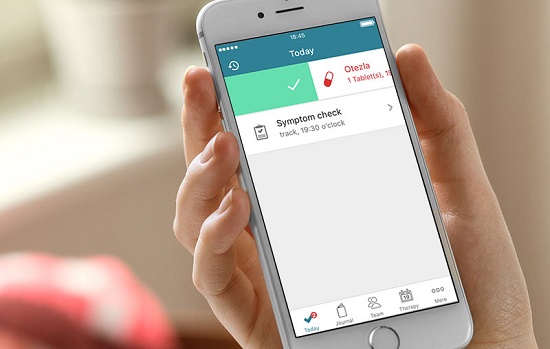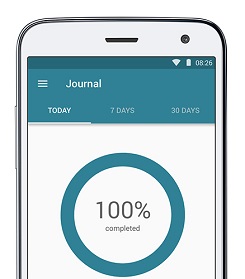Is Your Psoriasis Getting Under Your Skin? Manage Your Condition with a Medication Management and Health Tracker App
Life with Psoriasis Is Challenging Enough; Adhering to Your Treatment Shouldn’t Be. Use MyTherapy Today and Take Control of Your Psoriasis

Psoriasis is a chronic, autoimmune disease that often comes and goes (periods called flare-ups and remission). It is a common condition that affects the skin, although it has been linked to other health conditions . Psoriasis, which affects about 3% of the global population, is characterized by skin cells that multiply at an abnormal rate, causing raised, red plaques covered in white scales. The condition usually occurs on the knees, elbows, and scalp. There’s no cure for psoriasis yet, but there are many ways to manage it and alleviate symptoms. The treatment options are diverse and may include ointments, light therapy, and medications that affect the immune system. Common to all forms of treatment regimens is that they must be implemented and adhered to strictly. By adhering to your treatment plan, you will be able to maintain longer periods of remission, alleviate symptoms, and also prevent any other complications linked to psoriasis from developing. Integrating therapy into everyday life is not always an easy task. Therefore, to develop a routine and improve your psoriasis, smartphones can offer you some valuable support. Special health apps, like MyTherapy, have been designed to help you better manage chronic diseases, like psoriasis.
MyTherapy, one of Europe’s leading medication reminder and health tracker apps, has been developed specifically for people with chronic diseases and is therefore ideal for the treatment of psoriasis. Firstly, the app generates reminders for medication and doctors’ appointments. Whether you take medication or need to apply ointment, the app will remind you when and how to do so. All your reminders are therefore converted into a simple to-do list, which can be processed daily. Furthermore, treatment schedules, such as light therapy, can also be added to this list. All you have to do is upload the relevant information (via the app’s built-in barcode scanner, searching in the app’s database, or doing so manually) and the app will take care of the rest. And if you’re concerned about privacy, you can always set a passcode on the app so that no one else has access to it.
Secondly, MyTherapy comes with an integrated health journal to help you manage your psoriasis effectively. With the journal, you can track your symptoms and mood and record any other health-related information you feel is important. You can also set exercise goals, which can help improve your overall well-being.
At the end of the month, all the information you’ve recorded in the app can be converted into a health report, which you can share with your doctor. This will allow you to work closely with your healthcare professionals, ensuring that you get the best out of your treatment.
MyTherapy is consistently being developed and updated, as the team behind the app takes user feedback seriously. The app is therefore easy to use and understand and can be used by anyone of any age. With MyTherapy, you have the help you need to stick to your treatment regimen, thereby improving your symptoms and achieving remission as quickly as possible.
Psoriasis: Scaly Skin on Different Regions of the Body
There are different types of psoriasis and symptoms will therefore vary depending on the type you have. These types include:
- Plaque psoriasis
- Guttate psoriasis
- Inverse psoriasis
- Pustular psoriasis
- Erythrodermic psoriasis
The most common form is plaque psoriasis, as about eight in 10 people with psoriasis have this kind. The plaques from which the name is derived are patches of inflamed, raised skin with silvery-white scales. Guttate is the second most common form. It is characterized by small, red spots that often occur on the arms, legs, stomach, and chest. The other three forms are much rarer. You can learn more about the five types of psoriasis on our blog.
Varying Symptoms
Psoriasis is a condition that occurs in episodes and no one can predict how long each one will last. Symptom-free periods may also range from a few weeks to many years. Some of the most common symptoms of the different forms of psoriasis include:
- Plaque psoriasis: dry, raised, red skin lesions (plaques) covered with silvery scales.
- Guttate psoriasis: small sores that appear on the back, arms, legs, and scalp. It is more common in children and young adults.
- Inverse psoriasis: smooth, shiny patches of red, inflamed skin found in the armpits, under the breasts, behind the knee, or groin. These patches are usually very sore and only appear in the folds of the skin.
- Pustular psoriasis: red, swollen patches on the hands, feet, or fingertips that develop quickly with pus-filled bumps (pustules). This form of psoriasis can be life-threatening, so it is important to see a doctor immediately if the bumps spread quickly.
- Erythrodermic psoriasis: a red, peeling rash that can cover the entire body. The skin becomes itchy and painful and is almost like a bad sun-burn. Once again, it can be life-threatening.
There is also a condition known as psoriatic arthritis. It is not a form of psoriasis per se, but it is intrinsically linked. Psoriasis is characterized by inflammation of the skin and for those living with psoriatic arthritis, the inflammation affects the joints of the knees, ankles, and feet. Symptoms typically include pain, stiffness, swelling, and warmth. Between 20% to 30% of people living with psoriasis are estimated to develop psoriatic arthritis.
Psoriasis Is an Autoimmune Disease
The cause of psoriasis isn’t fully understood, but researchers believe it’s related to T-cells and other white blood cells in the body. If you have psoriasis, then your T-cells attack your healthy skin cells, mistaking them for something foreign. Therefore, psoriasis is an autoimmune disease, because the body attacks its own skin cells. Furthermore, overactive T-cells also trigger an increased production of healthy skin cells, thereby causing an ongoing cycle of new skin cell production. Skin cells therefore build up too quickly, resulting in the above-mentioned symptoms.
Researchers believe that the T-cells malfunction due to genetics and environmental factors. For example, having one parent with psoriasis increases your risk of getting the disease, and having two parents with psoriasis increases your risk even more. Anyone can develop psoriasis, but these factors/ triggers may increase your risk:
- Infections (tonsillitis and middle ear inflammation, tooth and nasal sinus infections, gastrointestinal infections, sexually transmitted diseases, HIV, and yeast infections)
- Skin irritation caused by severe sunburn, cuts, injuries, bug bites, or tattoos
- Metabolic disorders
- Hormone fluctuations
- Medications (beta-blockers, ACE inhibitors, lithium salts, interferons, chloroquine, certain non-steroidal anti-inflammatory drugs)
- Allergy-causing substances
- Stress
- Excessive consumption of alcohol
- Smoking
- Unhealthy diet
- Obesity
Psoriasis is also associated with other health conditions, like depression, cancer, metabolic syndrome, and cardiovascular disease.
In most cases, diagnosing psoriasis is straightforward. Your doctor will take your medical history, rule out other conditions, such as eczema, skin fungus or syphilis, and examine your skin, scalp, and nails. He/ she may also take a small sample of skin (biopsy) and have it examined under a microscope. Doctors may also use MRI scans and radiographs to diagnose psoriasis.
Treatment Options
While there is currently no cure for psoriasis, there are a number of effective treatments available. Psoriasis treatments aim to reduce the inflammation and clear the skin and can be divided into three main types:
- Topical treatments: creams and ointments are good for treating mild to moderate psoriasis. In more severe cases, creams are combined with oral medication or light therapy. Topical psoriasis treatments include corticosteroids, vitamin D analogues, anthralin, topical retinoids, calcineurin inhibitors, salicylic acid, coal tar, and moisturizers. These treatments aim to slow cell skin growth, remove scales, make skin smoother, reduce inflammation, and alleviate itching and dryness.
- Light therapy (phototherapy): this treatment makes use of either natural or artificial UV light, and can include using sunlight, UVB phototherapy, narrow band UVB phototherapy, Goeckerman therapy, psoralen plus ultraviolet A, and excimer laser. Light therapy helps with slowing cell growth, reducing inflammation, and controlling scaling.
- Oral or injected medications: these are used mainly in severe cases of psoriasis and include retinoids, methotrexate, cyclosporine, and drugs that alter or suppress the immune system. Some of these medications have severe side effects and should therefore only be used for short periods of time. Always consult your doctor immediately if you experience side effects.
Your doctor will choose a treatment plan best suited to your needs and type of psoriasis. You will usually start on milder treatments and progress to stronger ones if necessary. Furthermore, there are other medications available for conditions that are linked to psoriasis, such as depression.
Say So-Long to Psoriasis with MyTherapy
Living with psoriasis is already challenging enough - adhering to treatment shouldn’t be. Apps, like MyTherapy, can help you with medication management and managing your condition as effectively as possible. With the app’s integrated health journal, you can track your symptoms, medication side effects, triggers, and mood, thereby allowing you and your doctor to get a good idea of how you are doing with your current treatment plan and if anything needs to be adjusted. The app’s medication reminders can be used for any medication, including light therapy and doctors’ appointments. Thus, MyTherapy’s numerous features make it easy for you to stay on top of your treatment, thereby helping you to alleviate symptoms, stay in remission, and improve the quality of your life. With MyTherapy, you have everything you need to manage your condition, all in the palm of your hand.


